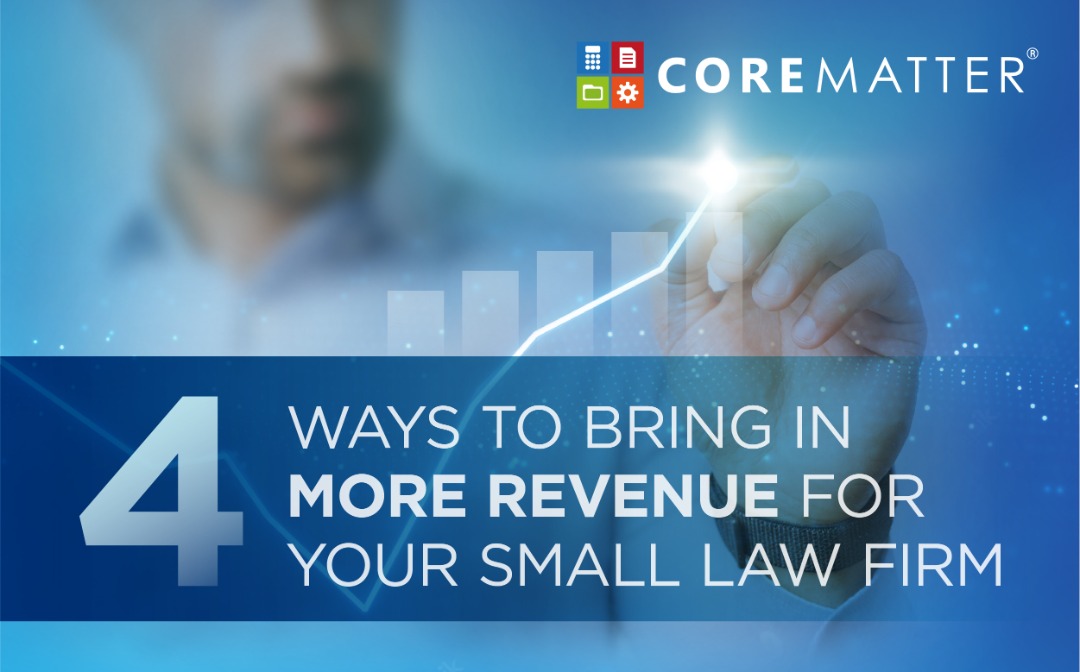
4 Ways to Bring in More Revenue for Your Small Law Firm
Is there value in creating jobs and generating revenue (and hence taxes)? Yes, and more: it’s about fulfillment for everyone involved in the law firm. And that is why we need to focus more on bringing in revenue for law firms.
As we phase into an endemic society, we see many law firms saddled with many Covid-19 related legal cases. These firms serve their clients affected by the outbreak, spanning geographies and specializations. But regardless of scale, many are looking at ways to boost revenue and improve operations. Today, we’ll focus on ways to increase revenue, especially if you’re a small law firm in need.
First, let’s begin by understanding what revenue is. Revenue is income earned by a law firm through its legal services and activities. You can check your cash flow statement to see how efficiently your law firm collects money for services rendered.
It sounds straightforward, but some gaps result in a less than desirable income level within the entire revenue-generating process. Just what are these gaps? We list them below:
- Manual legal accounting: Small law firm owners often struggle with manual legal accounting and reporting as it takes up a lot of time and effort.
- Billing Mistakes: 30% or more of law firm work are not billed by mistake or choice, especially with smaller firms purposefully not tracking hours to reduce legal fees for struggling clients. (Smokeball.com)
- Collection problems: 61% of small law firms reported getting paid by clients as a significant challenge. (Thomson Reuters Legal Executive Institute, 2019)
The above-listed gaps tend to become burdensome, especially when your law firm’s systems and processes are not equipped. Here, we’ll look at the strategies and solutions to address these gaps in the revenue-generating process to bring in more revenue to your law firm.
- Leverage legal technology
Legal technology has been proven to increase profitability. According to the 2019 Future Ready Lawyer Survey by Wolters Kluwer Legal & Regulatory, 68% of technology-led firms increased profitability between 2017 and 2018 as opposed to only 52% of the transitioning firms who are still adopting the full scope of legal technology.
Firms that use legal technology report increased efficiency and streamlined processes, resulting in increased profitability. For example, setting and automating a regular billing cycle establishes dedicated precedence with contacts. It takes out the guesswork and sudden recollections, often due to manually keyed in spreadsheets or sticky note reminders.
Leveraging legal technology like CoreMatter makes it more manageable for you to handle legal accounting, billing, and practice management. You get a dashboard of your firm’s vital data. It has everything from matter and case management, accounting, and billing to time tracking. All that data makes it easy for the software to provide insights valuable to partners who need to make critical decisions that drive revenue growth.
- Harness Data in Decision-Making
Your law firm generates a substantial amount of data every day. Using legal technology like CoreMatter helps you capture, identify and make sense of data to help you achieve revenue goals. Law firm partners will find the following data areas helpful:
- Time-tracking data: Helps you to identify your top performers and which case(s) they are spending the most time on..
- Billing data: Helps you keep track of efficient billing and set reminders that can support collections.
- Collection data: Tells you which clients are the well-paying ones so that you can improve client experience and retention.
- Expenses data: Shows you where the most significant expenses are and helps you to eliminate unnecessary costs.
- Improve Client Experience
While data is essential to derive revenue growth insights, client experience counts more. First, audit your law firm’s client experience to find out how your clients feel from onboarding to retention. You would then be able to find ways to improve workflows and grow your law firm by providing the most thoughtful and pleasant client experience. Happy clients translate to increased revenue.
- Give options: Cash or Credit Card Payment
You should always set up a payment system that works for your law firm, whether cash, check, debit card, or credit card. Accepting credit cards makes it easier for your clients to pay you. You will be paid faster because the transaction can be completed electronically, according to Clio’s 2017 Legal Trends Report. Clients who pay their legal bills with a credit card can earn points toward travel and other rewards and cashback for business or personal purchases outside the firm. Plus, paying with plastic is easier for clients than writing a cheque.
In a nutshell
Solo practitioners or small law firms often have to wear different hats to tackle client onboarding, practice management, accounting, and billing. It takes a substantial amount of time, precious time that they could dedicate to revenue growth.
Affordable legal practice management, accounting, and billing software like CoreMatter is a quick solution to improve law firm revenue and goals. With the help of CoreMatter, law firms can decide on a revenue goal, then look through the data such as attorney time tracking, billing, expenses, and advantageous practice areas, and take steps to improve those areas to meet the revenue goals and eventually, profitability.
_______
Sign up today for a free demo to learn more about how CoreMatter works!
CoreMatter, the leading cloud-based case management tool in Southeast Asia, frees your firm from the mess of the mundane to focus on what matters most.


